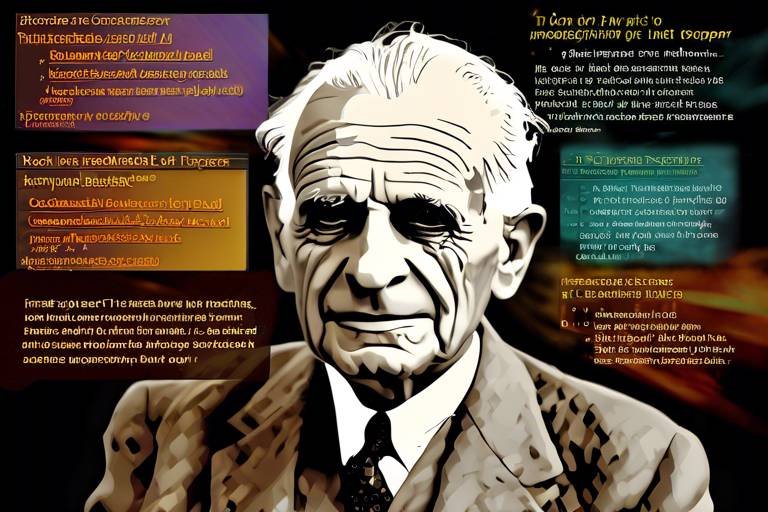Ludwig Wittgenstein's Work in Language and Philosophy
Ludwig Wittgenstein, a towering figure in 20th-century philosophy, has left an indelible mark on our understanding of language and its intricate relationship with reality. His work invites us to ponder profound questions: What is meaning? How do we communicate? And, perhaps most intriguingly, can language truly capture the essence of our thoughts and experiences? Wittgenstein's journey through the realms of language and philosophy is not just a scholarly pursuit; it's a deep dive into the very fabric of human understanding.
Born in Vienna in 1889, Wittgenstein's early life was steeped in a rich cultural milieu that fostered his intellectual curiosity. He initially trained as an engineer, but his fascination with the foundations of mathematics and logic led him to philosophy, where he would eventually challenge established norms. His first major work, the Tractatus Logico-Philosophicus, introduces the revolutionary concept of the Picture Theory of Language. This theory suggests that language functions like a picture of reality, where words correspond to objects and states of affairs in the world. It’s a striking idea that reshapes our understanding of how language operates—no longer merely a tool for communication, but a mirror reflecting the world itself.
However, Wittgenstein's philosophical evolution did not stop there. His later work, particularly in Philosophical Investigations, marks a significant shift in his thinking. He moves away from the rigid structure of the Picture Theory and introduces the concept of language games. This notion emphasizes that the meaning of words is not fixed but is shaped by their use in various social contexts. Just as players in a game follow different rules depending on the game being played, the meaning of language shifts and adapts based on the context in which it is employed. This perspective invites us to reconsider how we approach communication, urging us to recognize that understanding is deeply intertwined with the situations in which language is used.
Wittgenstein’s exploration of contextual meaning is particularly illuminating. He argues that words derive their significance from their usage in specific contexts, challenging the traditional view that meanings are static and universal. This fluidity of language raises essential questions: How do we navigate misunderstandings? How do we ensure that our intentions are accurately conveyed? In a world where communication is often fraught with misinterpretation, Wittgenstein's insights remind us of the importance of context in fostering genuine understanding.
Another pivotal aspect of Wittgenstein's philosophy is his notion of rule-following. He posits that understanding a language is akin to grasping the implicit rules that govern its use. Just as players must understand the rules of a game to participate effectively, individuals must learn the unwritten conventions of language to communicate meaningfully. This perspective emphasizes that language is not merely a set of symbols but a complex system of practices that requires active engagement and interpretation.
Wittgenstein's Private Language Argument further challenges conventional notions of language. He critiques the idea that an individual could possess a language comprehensible only to themselves, asserting that language inherently requires a shared public context for meaning to emerge. This argument raises profound implications for our understanding of personal experiences and expressions; it suggests that even our most intimate thoughts are inextricably linked to the communal fabric of language.
In addition to his groundbreaking ideas on language, Wittgenstein also delved into the realm of ethics and aesthetics. He proposed that these domains share a unique relationship with language, one that transcends mere description. For instance, when we express feelings of beauty or moral values, we often find ourselves grappling with the limitations of language. Wittgenstein famously stated, "Whereof one cannot speak, thereof one must be silent." This poignant remark highlights the boundaries of linguistic expression and invites us to contemplate the nature of understanding beyond words.
Wittgenstein's emphasis on silence serves as a powerful reminder that some truths may elude verbal articulation. In a world that often prioritizes verbal communication, his insights encourage us to explore the depths of understanding that lie beyond spoken language. This invitation to reflect on the nature of meaning challenges us to consider the myriad ways we connect with ourselves and others, prompting deeper contemplation on the essence of human experience.
- What is the Picture Theory of Language?
The Picture Theory suggests that language represents reality through pictures, with words corresponding to objects and states of affairs in the world. - What are language games?
Language games refer to the idea that the meaning of words is context-dependent and shaped by their use in various social practices. - What does Wittgenstein mean by rule-following?
Rule-following is the concept that understanding a language involves grasping the implicit rules that govern its use. - What is the Private Language Argument?
This argument critiques the idea of a language that is understandable only to an individual, asserting that language requires a shared public context. - How does Wittgenstein view the limits of language?
Wittgenstein believes that some truths cannot be expressed in words, emphasizing the importance of silence in understanding certain aspects of human experience.

The Picture Theory of Language
Ludwig Wittgenstein's early work laid the groundwork for a revolutionary approach to understanding language through his Picture Theory. This theory suggests that language functions as a kind of picture of reality. Imagine a snapshot capturing a moment in time; similarly, words and sentences can represent states of affairs in the world. Wittgenstein proposed that the relationship between language and the world is not arbitrary but rather corresponds to the way things are. In this framework, words are like labels on a map, guiding us through the complex terrain of reality.
To break it down further, the Picture Theory posits that a proposition is meaningful only if it can be shown to correspond to a fact in the world. For instance, if I say, "The cat is on the mat," this statement can be verified by observing the world. If the cat is indeed on the mat, then the proposition holds true; if not, it is false. This correspondence theory of truth is a cornerstone of Wittgenstein's early philosophy, and it challenges us to consider how our language interacts with our understanding of reality.
However, this theory isn't without its limitations. Wittgenstein later recognized that not all aspects of language could be captured by this pictorial representation. For example, consider expressions of emotion or commands; these do not neatly correspond to a particular state of affairs. Instead, they function differently within the fabric of language. This realization led him to further explore the complexities of language, prompting a shift in his philosophical approach.
To illustrate the Picture Theory, we can look at a simple table that summarizes its key components:
| Aspect | Description |
|---|---|
| Propositions | Statements that can be true or false, representing facts in the world. |
| Correspondence | The relationship between language and reality, where language reflects the world. |
| Limitations | Not all language can be reduced to pictorial representations. |
In essence, the Picture Theory serves as a fascinating entry point into Wittgenstein's thoughts on language. It invites us to ponder how our words relate to our experiences and the world around us. As we navigate through language, we must remember that while words can paint a picture, they can also obscure the reality they aim to depict. This tension between representation and reality is a theme that recurs throughout Wittgenstein's work, ultimately leading him down a path toward a more nuanced understanding of language's role in human life.

Language Games
Wittgenstein's later philosophy introduces us to the fascinating concept of . This idea revolutionizes our understanding of how language operates in everyday life. Imagine language as a game where the rules can shift depending on the players and the context. Just like in sports, where the rules vary from one game to another—think of soccer versus basketball—language too is not a one-size-fits-all. It evolves and adapts based on the situation and the participants involved.
The essence of language games lies in the notion that meaning is not fixed but is instead shaped by context. When we communicate, the meaning of our words can change dramatically depending on where we are and who we’re talking to. For instance, when someone says "Can you pass the salt?" during dinner, it’s a straightforward request. However, if that same phrase is uttered in a different context, like a philosophical debate, it might lead to a discussion about the nature of requests and the social norms surrounding them. This fluidity highlights the richness of language and its reliance on social interaction.
Wittgenstein emphasizes that to truly understand a language, one must grasp the implicit rules that govern its use. These rules are not like the rigid laws of mathematics; rather, they are more akin to the unwritten codes of conduct we follow in social situations. For example, consider how we adjust our language when talking to a friend versus a boss. The rules change, and so does our choice of words, tone, and even body language. This adaptability is what makes language so powerful and dynamic.
Moreover, Wittgenstein's exploration of language games leads to a deeper understanding of how we communicate complex ideas. He argues that the meaning of a word is deeply intertwined with its practical use in various activities. In this sense, words are tools that help us navigate our interactions. Just like a carpenter selects specific tools for different tasks, we choose our words based on the context and the message we wish to convey. This perspective encourages us to look beyond the surface of language and appreciate the intricate dance of communication.
In conclusion, the concept of language games opens up a world of possibilities for understanding human interaction. It invites us to consider how our language shapes our experiences and how we relate to one another. By recognizing that meaning is not static but rather a living, breathing entity, we can appreciate the art of communication in all its complexity.

Contextual Meaning
When we dive into Wittgenstein's concept of contextual meaning, it's like peeling an onion—layer by layer, revealing the complexities of how we understand language. Imagine trying to communicate with someone using only a few words without considering the situation or the relationship you have with that person. It would be like trying to navigate a maze blindfolded! Wittgenstein argued that the meaning of words is not fixed or static; rather, it dances and shifts depending on the context in which they are used. This idea challenges the traditional notion that words have a single, immutable definition.
Think about it: when you hear the word "bank," do you picture a financial institution, a riverbank, or something else entirely? The meaning comes alive through the context! Wittgenstein's perspective invites us to consider the various scenarios in which language operates. For instance, in a legal setting, the term "property" may refer to tangible assets, while in a philosophical discussion, it could evoke a deeper exploration of ownership and existence. This fluidity of meaning is crucial to understanding how we communicate effectively.
Moreover, Wittgenstein emphasized that language is embedded in our social practices. This means that the meanings we derive from words are shaped by our interactions and the cultural contexts surrounding us. To illustrate this, consider the following examples:
- In a friendly conversation, saying "You're the best!" could be a light-hearted compliment.
- In a competitive setting, the same phrase might carry a tone of sarcasm or rivalry.
This variability highlights how context is king! Wittgenstein’s approach encourages us to pay attention to the surrounding circumstances and the intentions behind our words, rather than relying solely on dictionary definitions. Understanding language as a series of games played within specific contexts allows us to appreciate its richness and depth.
In essence, Wittgenstein's exploration of contextual meaning shifts the focus from the words themselves to the dynamic interplay of language in our lives. It’s a reminder that communication is not merely about exchanging words, but about connecting with others in a meaningful way. So, the next time you engage in conversation, consider the broader context—what's the setting, what are the relationships at play, and how do those factors shape the meaning of your words?

Rule-Following
The concept of is a cornerstone in Ludwig Wittgenstein's later philosophy, acting as a bridge between language and its practical application in everyday life. According to Wittgenstein, understanding a language is not merely about memorizing vocabulary or grammar; it's about grasping the implicit rules that govern how we use words in various contexts. Imagine learning to play a game like chess. It's not just about knowing the moves of each piece; it's about understanding the strategies and the unwritten rules that make the game meaningful. In a similar vein, language operates within a set of rules that are often taken for granted yet are essential for effective communication.
Wittgenstein challenges us to rethink how we perceive meaning. He argues that meaning is not a static entity waiting to be discovered but is instead dynamic, evolving with each interaction. This perspective invites us to consider the following key aspects of rule-following:
- Contextual Usage: The meaning of a word can shift dramatically based on the context in which it is used. For instance, the word "bank" could refer to a financial institution or the side of a river, depending on the conversation.
- Shared Understanding: Language thrives on a communal understanding of rules. If everyone played chess by their own unique set of rules, the game would lose its meaning. Similarly, language requires a shared set of rules to function coherently.
- Learning Through Practice: Just as one learns to play chess through practice and experience, we learn language by engaging in social interactions. This experiential learning shapes our understanding of the rules governing language.
By emphasizing rule-following, Wittgenstein illuminates the social dimension of language. He posits that language is not an isolated system but a part of our communal life. This idea resonates with the notion that the meaning of a word is intertwined with its use in specific practices. In essence, language is a living entity that evolves as we engage with one another, reflecting our shared experiences and societal norms.
Wittgenstein's exploration of rule-following also leads to profound implications for how we approach philosophical inquiry. Instead of seeking to define terms in isolation, he encourages us to examine how language functions within the fabric of our daily lives. This approach not only demystifies complex philosophical problems but also provides a clearer lens through which we can understand the interplay between language, thought, and action. As we navigate our interactions, we come to appreciate that the rules of language, like the rules of a game, are essential for fostering meaningful dialogue and understanding.
What is rule-following in Wittgenstein's philosophy?
Rule-following refers to the implicit understanding of the rules that govern how we use language in various contexts. Wittgenstein believed that grasping these rules is essential to understanding language itself.
How does rule-following relate to the meaning of words?
According to Wittgenstein, the meaning of a word is not fixed but is determined by its use in particular contexts. This means that the same word can have different meanings depending on how and where it is used.
Why is shared understanding important in language?
Shared understanding is crucial because it allows people to communicate effectively. If each person interprets words according to their own unique set of rules, meaningful conversation becomes nearly impossible.
Can you give an example of rule-following?
Certainly! Consider the word "game." It can refer to a sport, a board game, or even a playful activity. The meaning shifts based on context, and understanding how to use it correctly requires knowledge of the rules surrounding its usage.

Private Language Argument
The is one of Ludwig Wittgenstein's most compelling critiques of traditional notions of language. At its core, Wittgenstein challenges the idea that individuals can develop a language that is entirely private, understandable only to themselves. Imagine trying to play a game where only you know the rules; it would be impossible to engage with anyone else. This analogy captures the essence of Wittgenstein's argument. He posits that language is inherently a social phenomenon, requiring a shared context for meaning to emerge.
Wittgenstein argues that the very essence of language is rooted in public use and communal understanding. He asserts that for a language to function, there must be a community of speakers who share the same rules and meanings. Without this shared context, words lose their significance. To illustrate this, consider the following points:
- Meaning is Social: Words derive their meaning from the way they are used within a community. If a person were to create a private language with unique words, those words would lack meaning outside of their own mind.
- Rule-Dependent: Understanding a language involves grasping the implicit rules that govern its use. If those rules are known only to one person, the language itself becomes meaningless.
- Communication Necessity: Language's primary function is to facilitate communication. A private language, by its very nature, cannot serve this purpose.
Wittgenstein's argument extends beyond mere semantics; it touches on the very nature of human interaction. He emphasizes that language is a tool for expressing thoughts, emotions, and experiences that are inherently shared. When we speak, we are not just stringing words together; we are engaging in a dance of understanding, where each partner needs to know the steps. Thus, the idea of a private language becomes not only impractical but fundamentally flawed.
This argument has profound implications for philosophy and linguistics, challenging us to reconsider how we think about language and meaning. It invites us to reflect on the nature of our communication and the shared experiences that shape our understanding of the world. Ultimately, Wittgenstein's Private Language Argument serves as a reminder that language is not just a collection of words; it is a living, breathing entity that thrives on social interaction and shared meaning.
- What is the Private Language Argument? The Private Language Argument is Wittgenstein's critique of the idea that an individual can create a language that is understandable only to themselves.
- Why is shared context important in language? Shared context is crucial because it allows words to have meaning and facilitates communication among individuals.
- How does this argument impact our understanding of language? It challenges us to see language as a social construct, emphasizing the importance of communal understanding in the formation of meaning.

Critique of Philosophical Problems
Ludwig Wittgenstein's approach to philosophy was revolutionary, as he believed that many of the problems that plagued philosophers were not genuine issues but rather misunderstandings of language. He argued that when we encounter philosophical puzzles, we often find ourselves tangled in a web of words, leading us to think we are addressing profound questions when, in reality, we are simply misusing language. This perspective is akin to trying to solve a riddle that doesn’t exist; the more we probe, the more confused we become. Wittgenstein’s goal was not to provide solutions to these problems but to clarify how language operates, aiming to dissolve confusion rather than resolve it.
Consider, for instance, the philosophical debates surrounding concepts like truth and meaning. Wittgenstein suggested that these discussions often stem from a failure to recognize the fluid nature of language. Just like trying to catch water with your hands, the more we grasp at rigid definitions, the more elusive our understanding becomes. He proposed that instead of seeking fixed meanings, we should observe how words function in different contexts, much like watching a play unfold on stage. Each word takes on a new role depending on its setting, and by understanding these roles, we can untangle the philosophical knots that have ensnared thinkers for centuries.
To illustrate his point, Wittgenstein introduced the idea of language games, emphasizing that the meaning of a word is not static but rather dynamic, changing with its use in various forms of life. This perspective invites us to rethink our approach to philosophical problems. Instead of asking, “What is truth?” we might ask, “How do we use the word ‘truth’ in our conversations?” By shifting our focus to the practical use of language, Wittgenstein believed we could clarify and ultimately dissolve many philosophical dilemmas.
Moreover, Wittgenstein's critique extends to the very nature of philosophical inquiry itself. He challenged the notion that philosophy should strive for certainty, arguing instead that it should embrace the ambiguity of language. This is reminiscent of a painter who chooses to leave some areas of their canvas unfinished, allowing the viewer to engage with the artwork in a personal way. In the same vein, Wittgenstein believed that acknowledging the limitations of language can lead to a more profound understanding of our experiences and thoughts.
In essence, Wittgenstein's critique of philosophical problems serves as a reminder that the clarity we seek often lies not in finding definitive answers but in recognizing the complexity of language and its role in shaping our understanding of the world. By embracing this complexity, we can free ourselves from the constraints of traditional philosophical thought and open the door to new avenues of inquiry and exploration.
- What is Wittgenstein's Picture Theory of Language?
Wittgenstein's Picture Theory suggests that language represents reality through pictures, establishing a connection between words and the world they describe. - What are language games?
Language games refer to the idea that the meaning of words is determined by their use in specific contexts, emphasizing the dynamic nature of language. - How does Wittgenstein view philosophical problems?
Wittgenstein believed that many philosophical problems arise from misunderstandings of language, and he aimed to clarify these issues rather than solve them. - What is the significance of silence in Wittgenstein's philosophy?
Wittgenstein emphasized that some truths are beyond verbal expression, suggesting that silence can hold profound meaning and understanding.

Ethics and Aesthetics
Ludwig Wittgenstein's exploration of ethics and aesthetics reveals a fascinating intersection between language and our moral and artistic sensibilities. He believed that both ethics and aesthetics are deeply intertwined with language, serving not just as modes of expression but as ways of understanding our place in the world. What if we viewed language not merely as a tool for communication but as a living entity that shapes our ethical and aesthetic judgments? This perspective opens up a myriad of questions about how we articulate our values and experiences.
Wittgenstein suggested that ethical statements are not just factual claims but rather expressions of our emotional responses and attitudes. When we say something is good or beautiful, we are not merely describing it; we are engaging in a complex interplay of feelings, cultural norms, and personal experiences. This challenges the traditional view that ethical and aesthetic judgments can be neatly categorized or universally defined. Instead, they are fluid and context-dependent, much like language itself.
Consider this analogy: just as a painter chooses colors based on the emotions they wish to evoke, individuals navigate their ethical landscapes through the language they employ. The words we use carry weight, and the meanings we attach to them evolve over time and through societal interactions. This leads us to the idea that ethics and aesthetics are not static but are rather dynamic processes that reflect our ongoing conversations with the world around us.
Wittgenstein famously stated, “Whereof one cannot speak, thereof one must be silent.” This quote encapsulates his view on the limitations of language, especially concerning ethics and aesthetics. There are aspects of human experience—such as deep moral dilemmas or profound artistic feelings—that elude verbal expression. This invites us to consider the role of silence and the unsaid in our understanding of these domains. Sometimes, the most significant truths are those that we cannot articulate, leaving us to ponder their meaning in silence.
In this context, Wittgenstein's work prompts us to reflect on the nature of our ethical and aesthetic experiences. Are we truly able to convey the depth of our feelings through language, or do we fall short? This reflection leads to a richer understanding of how we engage with art and morality, acknowledging that our expressions are often incomplete yet profoundly significant.
Ultimately, Wittgenstein's insights into ethics and aesthetics challenge us to think critically about the language we use and the meanings we create. They remind us that our moral and artistic lives are not just about what we say but about how we say it and the shared contexts that inform our expressions. As we navigate the complexities of life, we must remain open to the nuances of meaning that language offers, recognizing that every word carries with it a world of implications.
- What is Wittgenstein's view on the relationship between language and ethics?
Wittgenstein believed that ethical statements are expressions of our emotions and attitudes, rather than mere factual claims. This means that our moral judgments are deeply intertwined with the language we use.
- How does Wittgenstein connect aesthetics with language?
He argued that aesthetic judgments are also context-dependent and reflect our emotional responses, similar to ethical expressions. Language plays a crucial role in articulating these experiences.
- What does Wittgenstein mean by the limits of language?
His famous quote, "Whereof one cannot speak, thereof one must be silent," suggests that there are truths and experiences that cannot be adequately expressed through language, highlighting the limitations inherent in our verbal expressions.

Limits of Language
When we dive into the depths of language, we often find ourselves grappling with its limitations. Wittgenstein famously stated, “Whereof one cannot speak, thereof one must be silent.” This powerful assertion serves as a reminder that there are realms of human experience that elude verbal expression. Just think about it: how can we adequately describe the feeling of love, the essence of beauty, or the weight of sorrow? Words often fall short, leaving us with a sense of frustration and wonder.
Wittgenstein's exploration of the limits of language invites us to consider the boundaries of our communication. He believed that language is not just a tool for conveying information; it shapes our understanding of the world. For instance, consider how different cultures have unique words that encapsulate feelings or concepts that may not even exist in other languages. This phenomenon illustrates the idea that language is inherently tied to our experiences and cultural contexts.
Moreover, Wittgenstein emphasized that the limitations of language are not merely about vocabulary or grammar. Instead, they stem from the very nature of meaning itself. Language is a social construct, and its meanings are fluid, shaped by the contexts in which they are used. This fluidity can lead to miscommunication and misunderstanding, as what one person intends to convey may not resonate the same way with another. For example:
| Word | Meaning in Different Contexts |
|---|---|
| Love | Romantic affection, familial bond, or platonic friendship |
| Freedom | Political liberty, personal choice, or social responsibility |
| Home | Physical dwelling, sense of belonging, or emotional safety |
This table illustrates how a single word can carry various meanings depending on the context. Such complexities highlight Wittgenstein's assertion that language is a living entity, one that evolves and adapts as we navigate our social landscapes. The challenge lies in recognizing these limitations and embracing the idea that some truths may be better left unspoken.
In essence, Wittgenstein's exploration of the limits of language encourages us to reflect on our communication practices. It urges us to seek understanding beyond mere words, to listen actively, and to appreciate the silence that often accompanies profound truths. After all, some of the most profound connections we share with others occur in moments of silence, where understanding transcends verbal expression.
- What is the significance of Wittgenstein's statement about silence?
Wittgenstein's statement emphasizes that there are aspects of human experience that cannot be adequately expressed in words, highlighting the limitations of language. - How does context affect the meaning of language?
Context shapes how words are understood, leading to different interpretations based on cultural, social, and situational factors. - Can language ever fully capture human experience?
While language is a powerful tool for communication, it often falls short in expressing complex emotions and experiences, suggesting that some truths may remain beyond verbal articulation.

Whereof one cannot speak, thereof one must be silent,
This article explores the profound contributions of Ludwig Wittgenstein to language and philosophy, highlighting his key ideas, theories, and the impact they have had on contemporary thought.
Wittgenstein's early work introduced the Picture Theory, which posits that language represents reality through pictures, providing a framework for understanding the relationship between words and the world.
In his later work, Wittgenstein developed the concept of language games, emphasizing the context-dependent nature of meaning and how language functions in various social practices.
Wittgenstein argued that the meaning of words is rooted in their use within specific contexts, challenging traditional views of fixed meanings and highlighting the fluidity of language.
The notion of rule-following is crucial in understanding how language operates. Wittgenstein contended that understanding a language involves grasping the implicit rules governing its use.
Wittgenstein's private language argument critiques the idea of a language understandable only to an individual, asserting that language inherently requires a shared public context.
Wittgenstein believed many philosophical issues stem from misunderstandings of language. By clarifying how language operates, he aimed to dissolve these confusions rather than solve them.
Wittgenstein also explored the connections between language, ethics, and aesthetics, suggesting that these domains share a unique relationship with language that transcends mere description.
He famously stated, Whereof one cannot speak, thereof one must be silent, highlighting the limitations of language in expressing certain aspects of human experience.
Wittgenstein's emphasis on silence underscores the idea that some truths may be beyond verbal expression, inviting deeper contemplation on the nature of understanding and meaning.
This profound statement encapsulates a critical aspect of Wittgenstein's philosophy. It suggests that there are boundaries to what can be articulated through language. Imagine trying to describe the taste of a fruit to someone who has never tasted it; no matter how eloquently you express yourself, the essence of that experience remains elusive. Wittgenstein urges us to recognize that some realities are simply beyond the capacity of words.
In a world where we often feel compelled to articulate every thought and feeling, this idea serves as a powerful reminder. It encourages us to embrace the limits of our language and the silence that accompanies those limits. There are moments in life—perhaps during profound emotional experiences or when confronted with the mysteries of existence—where words fall short. In these instances, silence can be a more genuine response than any verbal articulation.
Moreover, this perspective invites us to reflect on the nature of understanding itself. If language is a tool for communication, then what happens when it fails us? Wittgenstein suggests that instead of forcing meaning into words, we should accept that some truths are ineffable. This acceptance can lead to a deeper appreciation of the complexities of human experience, where silence becomes a space for contemplation and connection.
In conclusion, Wittgenstein's assertion not only challenges our reliance on language but also opens the door to a richer understanding of existence. It encourages us to explore the depths of silence, where the unspeakable may reside, and to find comfort in the acknowledgment that not everything needs to be verbalized.
- What is the main idea behind Wittgenstein's Picture Theory?
Wittgenstein's Picture Theory posits that language functions as a representation of reality, where words serve as pictures that depict the world around us. - How do language games differ from traditional views of language?
Language games emphasize the context and social practices that shape meaning, suggesting that understanding language requires recognizing its varied uses across different situations. - What does Wittgenstein mean by the limits of language?
Wittgenstein argues that there are aspects of human experience that cannot be adequately expressed through language, leading to his famous statement about silence. - Why is silence significant in Wittgenstein's philosophy?
Silence represents the acknowledgment of the limitations of language and the recognition that some truths may be beyond verbal articulation, inviting deeper contemplation.

highlighting the limitations of language in expressing certain aspects of human experience.
This article explores the profound contributions of Ludwig Wittgenstein to language and philosophy, highlighting his key ideas, theories, and the impact they have had on contemporary thought.
Wittgenstein's early work introduced the Picture Theory, which posits that language represents reality through pictures, providing a framework for understanding the relationship between words and the world.
In his later work, Wittgenstein developed the concept of language games, emphasizing the context-dependent nature of meaning and how language functions in various social practices.
Wittgenstein argued that the meaning of words is rooted in their use within specific contexts, challenging traditional views of fixed meanings and highlighting the fluidity of language.
The notion of rule-following is crucial in understanding how language operates. Wittgenstein contended that understanding a language involves grasping the implicit rules governing its use.
Wittgenstein's private language argument critiques the idea of a language understandable only to an individual, asserting that language inherently requires a shared public context.
Wittgenstein believed many philosophical issues stem from misunderstandings of language. By clarifying how language operates, he aimed to dissolve these confusions rather than solve them.
Wittgenstein also explored the connections between language, ethics, and aesthetics, suggesting that these domains share a unique relationship with language that transcends mere description.
He famously stated, “Whereof one cannot speak, thereof one must be silent,” highlighting the limitations of language in expressing certain aspects of human experience. Language, as Wittgenstein pointed out, is a tool designed to convey thoughts, emotions, and observations. However, there are profound experiences—like grief, love, or existential dread—that often elude precise articulation. Think of it this way: trying to capture the essence of a sunset in words is like trying to catch water with a sieve. The beauty, the colors, the feelings they evoke often slip through the cracks of language, leaving us with mere shadows of our true sentiments.
This limitation prompts a deeper inquiry into the nature of understanding itself. How can we truly share our internal experiences with others when the very words we choose may fall short? Wittgenstein’s assertion invites us to reflect on the moments when silence becomes a more potent form of expression than words. For instance, consider a comforting embrace shared between friends during a time of loss. In that moment, the absence of words speaks volumes, conveying solidarity and empathy far beyond what language could express.
Wittgenstein's emphasis on silence underscores the idea that some truths may be beyond verbal expression, inviting deeper contemplation on the nature of understanding and meaning. Silence can serve as a canvas for our thoughts, allowing us to ponder the complexities of life without the constraints of language. In a world that often prioritizes verbal communication, embracing silence can be a radical act of understanding.
- What is the Picture Theory of Language?
The Picture Theory suggests that language functions as a representation of reality, where words serve as pictures of the world. - How do language games differ from traditional views of language?
Language games emphasize that the meaning of words is determined by their use in various contexts rather than having fixed definitions. - What does Wittgenstein mean by the limits of language?
He posits that there are certain aspects of human experience that language cannot adequately express, suggesting that silence may sometimes be more meaningful. - Why is the Private Language Argument significant?
This argument asserts that language must be grounded in shared public contexts, challenging the notion of a private language that only one person can understand.

The Role of Silence
Wittgenstein's exploration of silence is nothing short of profound. He recognized that language, while a powerful tool for communication, has its limitations. In his view, there are certain truths and experiences that simply cannot be articulated through words. This brings us to a pivotal quote from his work: “Whereof one cannot speak, thereof one must be silent.” This statement doesn't merely suggest that silence is a fallback when words fail; rather, it implies a deeper understanding of the human experience and the complexities of existence.
Imagine trying to describe the feeling of love or the essence of beauty. Words can only scratch the surface. Wittgenstein believed that silence often holds more weight than verbal expression. It invites us to reflect, to ponder, and to engage in a kind of understanding that transcends mere description. In many ways, silence can be seen as a canvas upon which our thoughts and feelings can unfold without the constraints of language. It allows for a more authentic connection to our inner selves and to others.
Moreover, silence can serve as a powerful communicative tool in itself. Consider the moments of silence shared between friends or loved ones; these pauses can speak volumes. They can convey empathy, understanding, or even discomfort without the need for dialogue. Wittgenstein’s emphasis on the role of silence invites us to appreciate these moments and recognize their significance in our interactions.
In the context of philosophy, Wittgenstein's insights compel us to reconsider how we approach the limits of language. Rather than viewing silence as a deficiency, he encourages us to embrace it as a space for contemplation and deeper understanding. This perspective challenges us to think critically about what can be said and what remains ineffable, pushing us to explore the boundaries of our own understanding.
Ultimately, the role of silence in Wittgenstein's philosophy serves as a reminder that not everything can or should be expressed in words. It encourages us to listen—not just to others, but also to ourselves. By acknowledging the power of silence, we can cultivate a richer, more nuanced understanding of our experiences and the world around us.
- What is the significance of silence in Wittgenstein's philosophy?
Silence is significant in Wittgenstein's philosophy as it highlights the limitations of language and emphasizes that some truths are beyond verbal expression. It invites deeper reflection and understanding.
- How does Wittgenstein's view on silence differ from traditional views?
Unlike traditional views that may see silence as a lack of communication, Wittgenstein views it as a meaningful space for contemplation and deeper insight into human experiences.
- Can silence be a form of communication?
Yes, silence can communicate emotions and thoughts effectively. Moments of silence can convey empathy, understanding, or discomfort without the need for words.
Frequently Asked Questions
- What is Ludwig Wittgenstein's Picture Theory of Language?
The Picture Theory of Language, introduced by Wittgenstein in his early work, suggests that language functions like a picture of reality. It posits that words represent objects in the world, creating a framework for understanding how language relates to the things it describes. Essentially, it’s like saying words are snapshots of reality!
- What are language games according to Wittgenstein?
Wittgenstein's concept of language games highlights that the meaning of words is not fixed but rather depends on the context in which they are used. Think of it this way: just like playing different games requires different rules, using language in various social situations requires understanding the specific 'rules' that govern that context.
- How does Wittgenstein's Private Language Argument challenge traditional views?
Wittgenstein's Private Language Argument critiques the idea that individuals can have a language that only they understand. He argues that language inherently relies on a shared public context, meaning that for communication to happen, there must be common ground among speakers. It’s like trying to play a game without agreeing on the rules – it just doesn’t work!
- What did Wittgenstein mean by the limits of language?
Wittgenstein famously stated, "Whereof one cannot speak, thereof one must be silent." This highlights that language has its limitations, especially when it comes to expressing certain human experiences or feelings. Sometimes, there are truths that go beyond words, inviting us to reflect on the deeper aspects of understanding and meaning.
- How does Wittgenstein connect ethics and aesthetics with language?
Wittgenstein explored the intricate relationships between language, ethics, and aesthetics, suggesting that these domains are intertwined in a way that goes beyond mere description. He believed that our understanding of ethical and aesthetic values is deeply rooted in the language we use, shaping our perceptions and expressions of beauty and morality.
- Why does Wittgenstein believe philosophical problems arise from misunderstandings of language?
Wittgenstein argued that many philosophical confusions stem from a lack of clarity regarding how language functions. Instead of solving these problems, he aimed to clarify the use of language to dissolve the misunderstandings. It’s like clearing up a foggy window to see the world more clearly – once we understand how language works, many philosophical issues fade away!



















